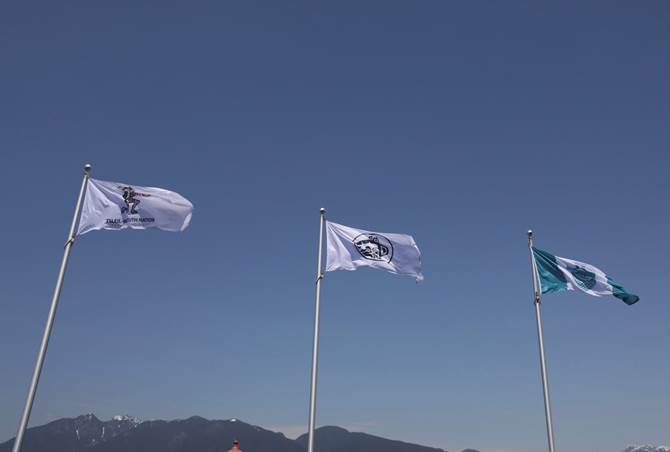The flags of the xʷməθkʷəy̓əm (Musqueam), Sḵwx̱wú7mesh (Squamish), and səlilwətaɬ (Tsleil-Waututh) nations will fly permanently in Vancouver’s Stanley Park.

The Vancouver Park Board held a flag-raising ceremony at spapəy̓əq Pápiy̓eḵ, commonly known as Brockton Point, on Tuesday.
It’s the first time the local First Nations flags have been permanently raised in one of the city’s parks. The move followed a recommendation from the Stanley Park Intergovernmental Working Group, which includes staff from the park board and the three nations.

“I am a direct descendant of the last Indigenous residents of Stanley Park. The violent and destructive removal of my family from their home at spapəy̓əqm is part of our history,” Musqueam Chief Wayne Sparrow said in a media release.
Sparrow said Vancouver’s park board was “instrumental” in ruling the former Indigenous occupiers to be squatters and burning their villages.

Get daily National news
“Today’s raising of the Musqueam, Squamish and Tsleil-Waututh flags at Brockton Point is a significant milestone in establishing a new relationship between Indigenous Peoples and the Park Board and ensuring the truth is remembered.”
The park board removed a trio of flag poles that used to display Canadian, B.C. and Union Jack flags at Brockton Point in 2017, due to age and safety concerns.

The working group later advised that replacing the colonial flags with those of the local First Nations could serve as a small recognition of their history in the area, and in 2022 the park board approved a plan to hoist them.
Tsleil-Waututh Chief Jen Thomas said the move marks another step in the reconciliation process.
“Displaying our flag at Stanley Park, a place enjoyed by the local community and visitors throughout the year, is one way that Tsleil-Waututh Nation is putting the face of our Nation back on our traditional territory,” she said.

“Raising these flags encourages the broader community to learn more about our history, culture and traditions,” added Wilson Williams of the Squamish Nation. “We have always been here, and we will always be here.”
The intergovernmental committee continues to work on a 100-year vision for Stanley Park, which the park board notes is of key significance to the three nations as a confluence of their traditional unceded territories.
It said the early “truth-telling” phase of the work has highlighted the erasure of the nations’ histories and is identifying opportunities to redress historic actions and improve acknowledgment of the nations in the park.
- Here’s what we know about the Tumbler Ridge mass shooting investigation
- B.C. 2026 budget ‘neither’ big cuts nor tax increase, minister says
- Former Conservative leader John Rustad says he’s not running for his old job
- Parts of B.C.’s South Coast set to see snow-rain mix with ‘rapidly changing’ travel conditions








Comments
Want to discuss? Please read our Commenting Policy first.